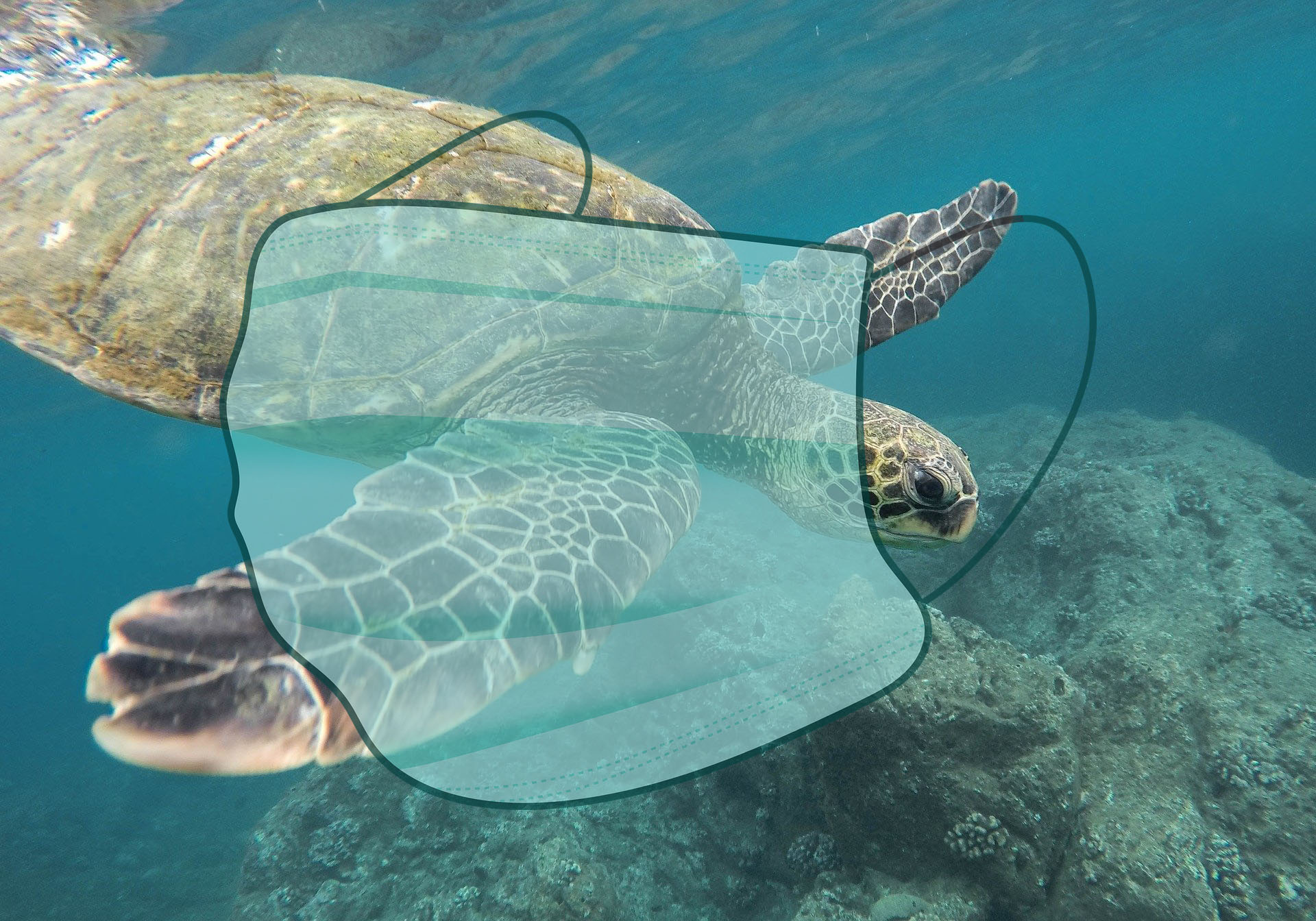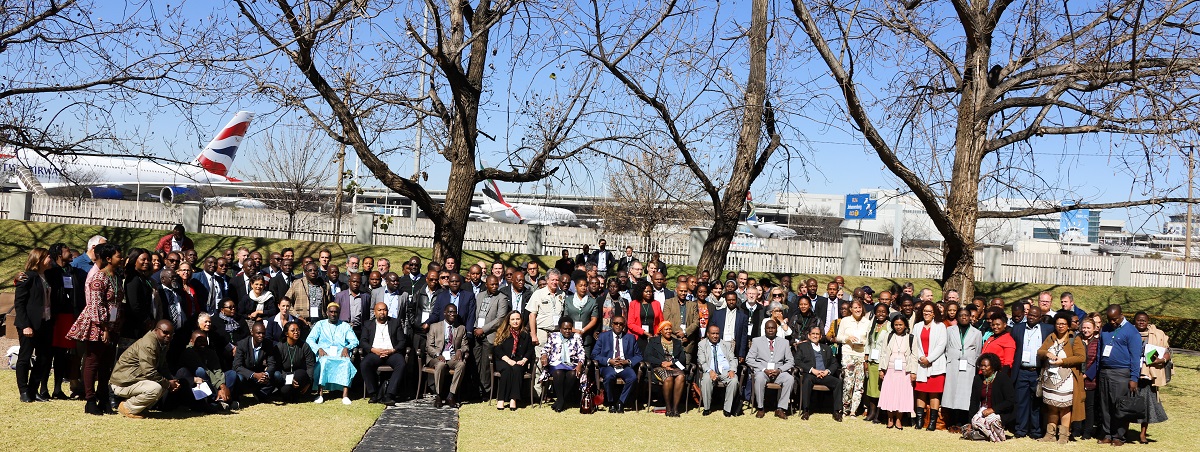World Oceans Day 2021: a new opportunity for law to step up
World Oceans Day is here again and this year seems to be as meaningful as it is challenging for ocean governance. Never before has the connection between nature and human health been more evident for our generations. The effects of the pandemic, both positive and negative, have been portrayed by nature and its different ecosystems. The ocean is of course no exception.

Turtle and a mask
Photo: Collage IUCN ELC
The Ocean after COVID-19
A forced slow-down on activities like coastal and marine tourism, shipping, and even fisheries, has led to a reduction in the pressures of pollution, overfishing, habitat loss, invasive species introductions and the impacts of climate change on the ocean. This seemingly temporary breather may indicate hope for the recovery of marine and coastal ecosystems. However, for some of the major threats to ocean health a greater effort derived from science and policy reforms is needed.
“As much as 10-15 years of reduced fishing is required to permit depleted stocks to recover, so in the absence of governance and management reforms that sustain reduced pressure, such recoveries seem unlikely[1]”.
At the same time, new pressures have arisen from the changed behaviours imposed by dealing with a global health issue of this type. Masks, gloves, and bottles of hand sanitizer have become an essential part in the fight against the pandemic, but also a major global environmental polluter.
“Globally, 65 billion gloves are used every month. The tally for face masks is nearly twice that—129 billion a month. That translates into 3 million face masks used per minute[2]”.
As expected from already alarming plastic pollution rates before COVID-19, a high percentage of these discarded personal protection products end up in the ocean. Various organizations around the world already sounded the alarm on the number of masks and gloves they have found in their regular research and observation. As we were already expecting more plastic than fish in the ocean by 2050, at the current rate some say we can also expect more masks than jellyfish swimming around.
A new medical frontier
Historically, science has based major findings in the quest for remedies and vaccines in nature. Different types of natural resources are the bases of the development of important drugs and remedies to treat and cure innumerable diseases.
"Four billion people today rely primarily on natural medicines and 70 per cent of cancer drugs - whether natural or synthetic - are inspired by nature (WHO)[3]".
Up until now, the majority of the medical drug sources come from terrestrial organisms, where most of the scientific research has taken place on this topic. However, the need for innovation, newly surfacing diseases, and other medical challenges have pushed researchers to turn their eyes to the very rich and diverse universe of marine organisms and ecosystems. This situation poses added questions in terms of regulating access to and use of marine genetic resources to assure health for the human population, while maintaining the equilibrium for marine ecosystems.
2021 opportunities for regulation and future vision
The first year of a new decade coincides with the time to re-direct and update major environmental and ocean policies that will guide the way in the next decade (at least). Major conferences and events that were scheduled for what was supposed to be the Super Year for Nature 2020, were inevitably pushed to 2021. This year presents the opportunity to deal with the pressing climate crisis, nature, and development challenges together. Most of these events can be linked to the ocean and the current situation, including such major events as:
Every four years, thousands of leaders and decision-makers from government, civil society, indigenous peoples, business, and academia come together with the goal of improving management of the natural environment for human, social and economic development. As a result of the Congress a set of resolutions proposed by members will be made official and become clear commitments for action in the next 4 years. Many of the proposed resolutions relate to ocean pollution, biodiversity, and management. The Congress is a crucial opportunity to align views and future engagements for key actors in a better ocean governance after COVID-19.
The United Nations Decade on Biodiversity 2011-2020 and its Aichi
Targets have come to an end, and it is now time for an ambitious new global biodiversity framework. The new possible goals of this emerging framework will be notably relevant in relation to ocean governance and the proposed idea to protect 30% of the ocean by 2030. Furthermore, it is also important to place emphasis on the link between ocean resources and the topic of access to genetic resources and benefit sharing, making sure that there is a connection between the different instruments related to the Convention on Biological Diversity, and those that deal with marine genetic resources, including UNCLOS and the future BBNJ Agreement.
The process for developing a legally binding instrument under the UN Convention on the law of the Sea (UNCLOS) on the conservation and sustainable use of marine biological diversity in areas beyond national jurisdiction (BBNJ) is coming to its final negotiation meeting. One of the four elements of the “package” of negotiations includes precisely Marine Genetic Resources (MGRs) including questions on the sharing of benefits. As UNCLOS predates some considerable developments on this topic, a new Agreement is the perfect opportunity to regulate the fast-paced research and interests in the use, intellectual property rights, and commercialization of these resources. The IUCN Environmental Law Centre works together with the IUCN Global Marine and Polar Programme and experts from the World Commission on Environmental Law on the BBNJ negotiations to provide input into ensuring that the Agreement includes equitable and fair provisions in regards to access and benefit sharing of MGRs in Areas Beyond National Jurisdiction (ABNJ).
These and many other events, meetings, and negotiations on climate, biodiversity, and environmental issues in general, present a decisive moment to come together and cooperate for enhanced protection and sustainable use of our marine resources in benefit of the whole ecosystem and our own wellbeing.
Building back better for the ocean after COVID-19
In times where the effects of biodiversity threats on human health are extremely present, Law should act as a catalyst for building better ocean governance. The year 2021 is a chance for new global, international and national policies that acknowledge blue economy as a growing sector for more and better-quality job opportunities, that are mindful of the connection between the health of our oceans and human health, and that finally make ocean protection a global priority with a vision of the future. Our success in facing future global challenges will largely depend on how we decide to manage our oceans from now on.
Prepared by Mariana Blanco, IUCN Environmental Law Centre
mariana.blanco@iucn.org
[1] The ocean and COVID-19 | United Nations Development Programme (undp.org)
[2] How to stop discarded face masks from polluting the planet (nationalgeographic.com)



